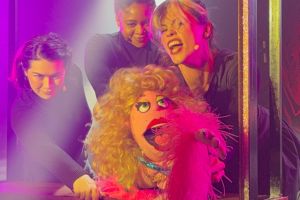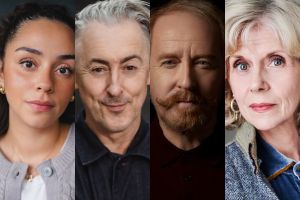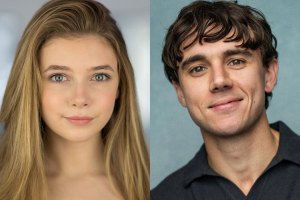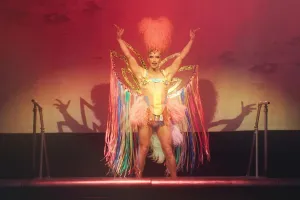20 Questions With … Rob Bettinson
Writer & director Rob Bettinson – whose international hit Buddy returns to take up residence at its third West End home this week – discusses the Buddy Holly phenomenon, the unreality of TV talent shows & the relaxing pleasures of alpaca farming.
Rob Bettinson directed and co-wrote (with Alan Janes) the blockbuster bio-musical Buddy – The Buddy Holly Story for the West End and Broadway and directed the UK, US, Canadian and Australian tours. The show has won over a dozen major nominations and awards, including two Olivier Awards and a Tony Award.
As a director and writer, Bettinson’s many previous stage successes include an adaptation of Catherine Cookson’s The Fifteen Streets, which marked his West End debut in 1989 and was subsequently adapted by him as a TV mini series. In 1995 he received the Laurence Olivier Award for Best Musical for Jolson, along with his co-writer Francis Essex. Bettinson also directed Jolson, which enjoyed a successful run at the Victoria Palace and has since played throughout the world.
In 1997 Bettinson re-developed the 1993 Broadway musical version of The Goodbye Girl with Neil Simon, Marvin Hamlisch, David Zippell and Don Black at the West End’s Albery Theatre (now the Noël Coward), which he also directed. In 2000 he directed the Charles Aznavour musical Lautrec, and in 2002 he co-wrote and directed the musical 125th Street, set in Harlem’s Apollo Theatre, both productions playing at the Shaftesbury Theatre. He continued his collaboration with Alan Janes on their screen-to-stage musical Jailhouse Rock, which ended its 12-month run at the West End’s Piccadilly Theatre in April 2005.
Almost 50 years ago, Buddy Holly died in a fatal plane crash aged just 22. Buddy follows the tragically short life of the young singer-songwriter who changed the face of popular music, from his early days in Texas and the formation of his band The Crickets to becoming one of the world’s top recording artists, and concluding with his fatal tour of Midwest America with Ritchie Valens and The Big Bopper. The show features more than 20 of Holly’s greatest hits, including “Peggy Sue”, “Oh Boy”, “Rave On” and “Heartbeat”.
Date & place of birth
I’m now 52 and I was born and brought up in Billingham, Stockton-on-Tees.
Lives now in
With my wife Shirley and our children Kerry, Laura, Scott and Grant in a little village called Dunchurch in the heart of the Warwickshire countryside near Rugby. Some of the buildings still have thatched roofs and date back to the 15th century.
Sounds like a complete contrast to Theatreland.
It certainly is. During the first five years of Buddy I was travelling around a lot and needed to settle somewhere so we bought this rundown farmhouse and spent a lot of time renovating it. My wife is a trained a physiotherapist but she now works with me down on the farm.
Did you say farm?
Yes, we have 60 acres where we breed alpacas. We bought four alpacas a few years ago just for the kids, but now they’ve taken over our lives and we have 60 acres supporting 180 animals. Our eldest daughter does all the production side, processing the raw fleeces and marketing the products. We even have a shop on the farm, take in paying guests and sell alpaca-made items on the internet.
Does that mean you talk alpaca at home rather than theatre?
Well, I have to admit that a new language of alpaca studs and breeding stock has tended to dominate the Bettinson household for some time now, although Buddy creeps into the conversation now and then.
What made you want to get involved in theatre?
There’s not one single drop of theatrical blood in my family. My dad was a sheet metal worker. At school, the only time I ever went on stage was when the rugby team was dragooned into playing the pirates in a production of The Pirates of Penzance. When I left school I wanted to be a doctor, but as I flat-lined on my A Levels that idea was soon wiped out.
Did you train?
I trained as an actor at Manchester Polytechnic. I got in by accident. I was trying to scratch a living as a kitchen porter at a Butlin’s holiday camp, where I was so poor that a mate of mine used to give me bits of food every day. One morning I was reading a newspaper he’d wrapped around some fish fingers and saw an advert for the School of Theatre at Manchester Poly. I wrote on spec and they offered me an audition. I was so naive then that I had to phone to ask them what “audition” meant. I whipped myself off to Billingham public library and discovered that the plays section was only about a foot long, so I just chose what looked like the biggest chunk of writing, learned it by heart, turned up and much to my surprise they offered me a place. David Threlfall, Bernard Hill and Julie Walters were there at the time, and I was suddenly in a new world that I found truly exciting. Mind you, when we did improvisation classes I was usually the grumpy bloke in the corner.
What was your first professional job?
I had a few bit parts on TV but my first real job was with a Theatre in Education company in Coventry. I loved it because you’d research the material and be able to develop it in community centres and schools. It was a great team effort too, with a young Linda Bassett and Philip Whitchurch in the company.
How did the directing & writing begin?
After 18 months of acting with TIE, the directing and writing took over and I ended up running the company until about 1982. Later, after I had established myself as a director, I returned to the Belgrade Coventry with various productions including my adaptation of the Catherine Cookson novel The Fifteen Streets that transferred to the West End in 1989. It had toured successfully but bombed at the Playhouse Theatre. Luckily, that’s when Buddy came along and the rollercoaster started.
Did you think then that Buddy would turn into such a long-running success?
Never in a million years. Alan Janes, who co-wrote it, and I would have been happy if we had a year’s run. Buddy took off from the moment the show arrived at the Victoria Palace at the end of October 1989. I was stunned. When our producer Paul Elliott said we were taking the show to Broadway, I thought he meant Stratford Broadway. Then we started putting the first UK tour together and Canadian and Australian productions ,and it was definitely pack your bags time. After Buddy had run for around 13 years in London, Alan and I rewrote the show and made it faster, recasting it with younger, multi-talented actors. That put a lot of energy back in.
The latest production has been touring the UK. Why do you think it’s time for another West End outing for Buddy?
All I can say is that we’ve been selling lots of tickets and the audience reaction on the tour has been phenomenal. People bounce out of their seats automatically ten minutes before the end. Back in 1989, at first it was mostly the fans who came, but it succeeded over the years because of its broad popular appeal. Now we still get the old rockers who were at the show first time round – and who probably remember Buddy Holly when he was alive – and they not only bring their children but their grandchildren too.
Why have you cast two actors in the role of Buddy Holly?
Matthew Wycliffe and Dean Elliot have been sharing the role on tour so if one of them is off it’s never a second-best understudy who goes on. It’s not simply a question of wearing those Buddy Holly spectacles and playing guitar. Each actor playing Buddy has to go through six to eight weeks’ rehearsal to get himself match-ready and be able to handle the demands of the show. It looks simple but it isn’t. It’s almost like playing Hamlet. We’re so lucky to have found two lads who really can pull it off.
Have you ever thought of casting your next Buddy by popular vote on a TV talent show?
Not really. Apart from the publicity value, most of the success of these shows on TV comes through ridiculing the no-hopers who have no talent. I’ve always been into encouraging raw talent and developing potential within an ensemble. For me, TV talent shows aren’t reality but fantasy.
As a director, you are probably destined to be forever associated with Buddy. Is that a problem for you?
It was at first. I had only ever directed plays before Buddy, then suddenly I was being sent lots of scripts for rock ‘n’ roll shows. Fortunately Jolson came along and broke that mould, followed by The Goodbye Girl. Ironically, when Buddy transferred from the Victoria Palace to the Strand Theatre after a five-year run, it was Jolson that replaced it. I won’t complain if I go down in history as the man who co-wrote and directed Buddy.
When did you first become aware of Buddy Holly’s music?
Probably when I was a kid listening to the radio – which was one of those big bits of furniture in the corner that worked on valves. I was four when he died in 1959. I remember hearing Big Bopper, who was in the fatal air crash alongside him, always being played on the radio singing “Running Bear”, along with Tommy Steele and “Little White Bull”. Now try explaining that to the kids! Later I got to know about him from the 1978 film starring Gary Busey and then someone gave me a tape that I used to play in the car. What surprised me was how many hits he had – 22 songs in a period of just two years, all of which are still familiar to us.
Is there a new generation getting into Buddy Holly?
When our show first opened, it was very much about nostalgia and going back in time to the Fifties when Doris Day was on her way out and the Beatles hadn’t quite yet arrived. Now it’s more about seeing young talent growing in an exploding music industry that still had a rough and ready DIY feel. In some ways it’s a bit like the music scene today, in the sense that lots of young people now create things for themselves using computer technology and the internet. One of my daughters is studying music at Goldsmith’s and she records all her own demos at home, whereas even 20 years ago you had to use recording studios and they’d become citadels that were almost impossible to get into. I guess there will be even more interest in his life and work as we approach the fiftieth anniversary of his death. A new Broadway production of Buddy has been mooted and of course by then it will be the twentieth anniversary of the show.
How do you switch off?
I’m the sort that always has to keep busy. I never like hanging around between projects. The alpacas keep me sane. They are always there in the field every morning day in day out, whereas in the West End a show can close overnight.
Do you have a favourite West End theatre?
I’d love to work at the Theatre Royal Drury Lane for the rest of my life. But the space I am in now is always the one I like best. The Duchess is small and intimate, which is ideal for Buddy. It’s electric. On the recent tour, the smaller venues were the ones where the show really took off. They were throwing their knickers on the stage at Cheltenham – mostly big pants, but a few nice thongs as well!
Do you have a favourite Buddy Holly song?
“Raining in My Heart”. It’s a complete contrast to upbeat songs like“Peggy Sue” and “Rave On”. It touches his innocence.
Finally, why should anyone book to see Buddy this time round?
Because it’s a great night in the theatre. It touches people. When Buddy was killed in the air crash, they said it was the night the music died. But the music lives on and people still keep coming up after experiencing his amazing story and saying thanks for the best night out I’ve ever had.
– Rob Bettinson was speaking to Roger Foss
Buddy – The Buddy Holly Story opens on 7 August 2007 (previews from 3 August) at the West End’s Duchess Theatre.












